Mastering gardening doesn’t have to be difficult. With a few simple DIY tips, you can grow a thriving garden and enjoy the fruits of your labor. The first step is to research your climate, soil type, average rainfall, and sunlight exposure to determine what plants will thrive in your area. By choosing plants wisely, investing in quality tools, and providing proper care, you can create a beautiful and healthy garden.
Key Takeaways
- Research your climate, soil type, average rainfall, and sunlight exposure to determine what plants will thrive in your area.
- Choose plants wisely and read plant descriptions to ensure they will fit your available space and landscape.
- Invest in quality gardening tools, such as a shovel, hand trowel, pruning shears, gardening gloves, and garden knife.
- Choose the best spot for your garden by considering sunlight, soil quality, and access to water.
- Improve your soil quality by adding compost or organic matter.
- Fertilize your plants with a low-nitrogen, slow-release fertilizer for optimal growth.
- Follow planting instructions and space plants properly.
- Regularly weed your garden to prevent unwanted plants from choking out your plants.
- Protect your plants from insects and critters by planting lantana, garlic, and agave.
- Experiment with different plants and techniques, and don’t be afraid to ask for help or advice.
Finding the Right Plants for Your Garden
Start by finding out what plants are suitable for your climate, soil, and sunlight exposure. Doing some planning and preparation before starting your garden can be a rewarding experience. Consider plants that are cold or heat hardy depending on your region.
Starting small with a few easy-to-grow plants such as lettuce and tomatoes is a great way to begin. Reading plant descriptions can help ensure they fit your available space and growing conditions.
Investing in essential gardening tools like a shovel, hand trowel, bypass, and gloves can help make your gardening experience more successful. Choosing the right spot for your plants is vital, ensuring they have access to full sun, good soil, and water.
Amend your soil if necessary with compost or organic matter. This will add necessary nutrients and improve soil structure. Fertilize your plants with a low-nitrogen, slow-release fertilizer to provide the necessary nutrients to your plants.
Plant your seeds or seedlings according to the instructions on the plant tag, and remember to water and weed regularly. Consider mulching to help retain moisture and prevent weed growth.
Remember to start small and be patient with the learning process, as gardening takes time and practice to become successful.
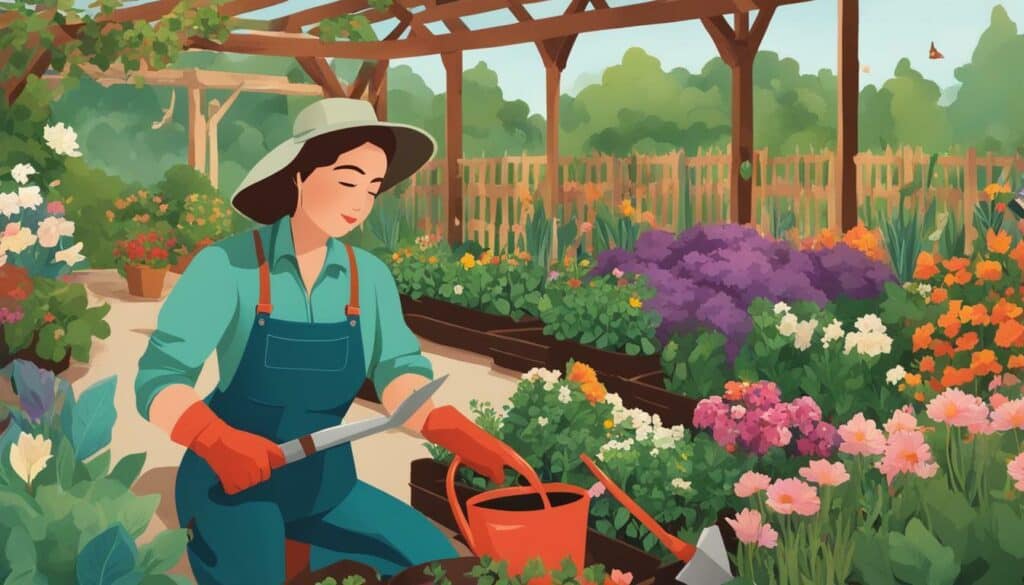
Investing in Quality Gardening Tools
Invest in good gardening tools like a shovel, trowel, bypass, and gloves to ensure successful gardening. These tools are essential for maintaining a healthy garden, and they can make a real difference in the quality of your plants.
Planning and research are also important before starting your garden. Determine what plants you can grow based on your climate, soil type, and sunlight exposure. Once you have decided on the plants you want to grow, it’s important to have the right tools to maintain them.
| Tool | Usage |
|---|---|
| Shovel | Used for digging holes and creating beds for plants. |
| Trowel | Used for planting and transplanting small plants. |
| Bypass | Used for deadheading, light pruning, and harvesting. |
| Hori Hori Knife | Used for digging weeds and dividing plants. |
| Gloves | Used for protection. |
The location of your garden is also crucial. Plants need full sun, quality soil, and access to water. Test your soil and add amendments if necessary. Fertilizing your plants with a low-nitrogen, slow-release fertilizer is also important.
When it comes to planting, be sure to follow the instructions on the plant tags for optimal results. Weeding is another essential task to keep your garden healthy. Regular weeding will prevent weeds from competing with your plants for nutrients and water.
Remember to be patient and don’t be afraid to ask for advice from experienced gardeners if needed. With the right tools and knowledge, anyone can become a successful gardener.
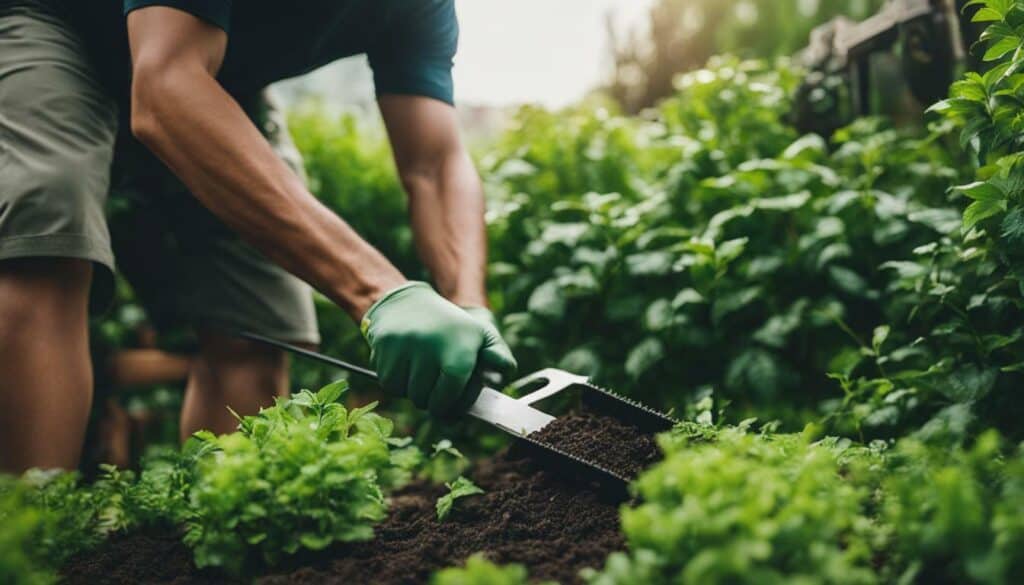
Choosing the Right Location for Your Garden
Pick a sunny spot with quality soil for your garden, or use containers and raised beds if space is limited. It’s crucial to choose the right location for your garden to ensure successful gardening. You should start by finding out your climate, soil type, average rainfall, and sunlight exposure, as these factors will determine what kinds of plants you can grow.
Consider the resources needed for plants to thrive, such as nutrient-rich soil, proper watering, and adequate sun exposure. Choose plants that are suitable for your climate and fit the available space in your garden. This will help you avoid overcrowding and ensure each plant has enough room to grow.
| Outdoor Improvement Ideas |
|---|
| Tip: Use the right tools, like a trowel, hand rake, watering can or hose, and gardening gloves. These tools will help make gardening easier and more efficient. |
Plant what you love and what grows well in your region. Take notes, pay attention to your plants, and don’t be afraid to ask for help or advice. Experienced gardeners can provide valuable insights and suggestions for improving your garden. Remember, gardening is a skill that improves with practice and experimentation, so don’t be discouraged if your first attempt isn’t perfect.
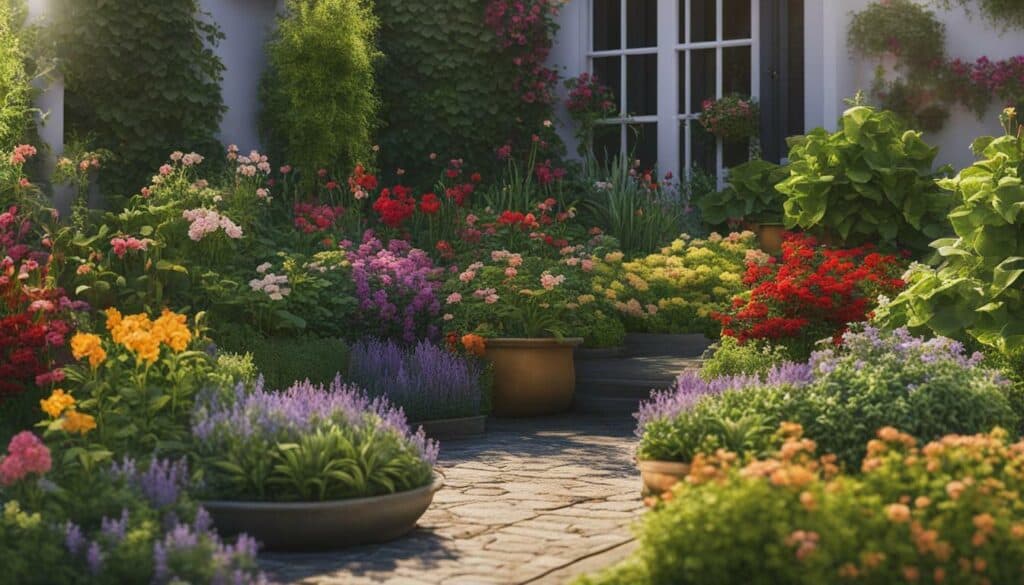
Enhancing Your Soil with Compost
Improving your soil is a vital practice when it comes to successful gardening. One of the best ways to do this is by adding compost or organic matter.
Before you begin, consider factors such as your climate, soil type, rainfall, and exposure to sunlight. Knowing your soil type can help you determine what type of compost or organic matter to add to optimize drainage.
I recommend investing in a good quality compost bin to create your own compost. Using kitchen scraps, leaves, and grass clippings can help produce nutrient-rich compost for your garden.
It is also essential to use a low-nitrogen, slow-release fertilizer to provide essential nutrients for your plants. Starting with easy-to-grow plants like herbs and vegetables can be beneficial for beginners.
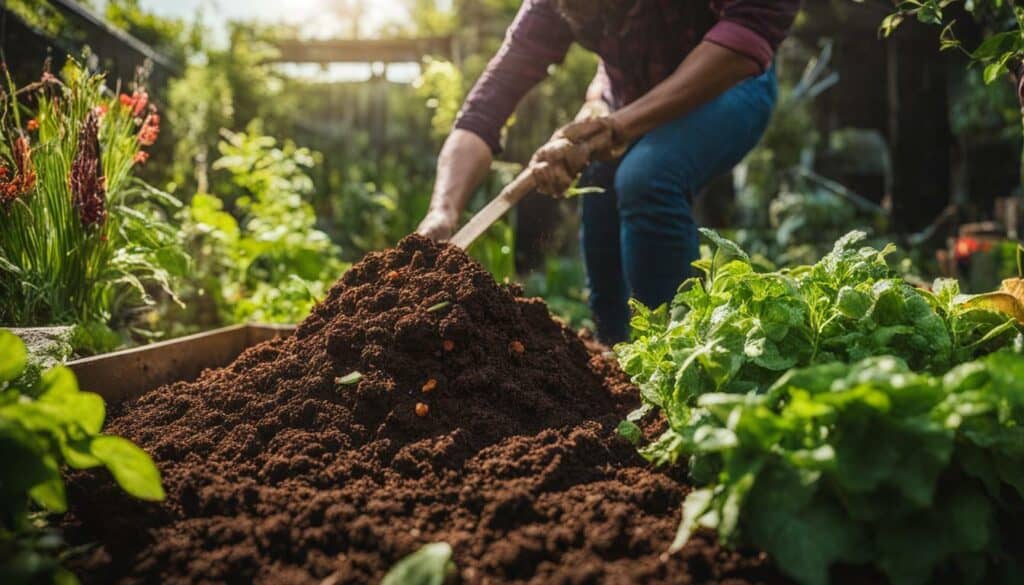
Mulching your garden can help retain moisture in the soil and prevent weed growth. Additionally, watering your plants at the right times and in the right amount is crucial. Remember to start small, take notes, and be willing to experiment and learn from the process.
With determination and knowledge, anyone can become a successful gardener. So why not start today and enhance your soil with compost?
Providing Nutrients with Fertilizer
Use a low-nitrogen, slow-release fertilizer, like Milorganite, to provide necessary nutrients for your plants. This type of fertilizer is “goof-proof” and can’t harm the plants. It’s important to add it at planting so the plants have the needed nutrients for most (if not all) of the growing season. Along with fertilizer, having rich, healthy soil and the right amount of water and sunlight is crucial for the plants to thrive.
Starting small, using the right tools, and planting what you love are also key tips for beginners. Taking notes, paying attention, and not being afraid to ask questions will help improve gardening skills over time. Don’t give up, as trial and error is part of the learning process in gardening.
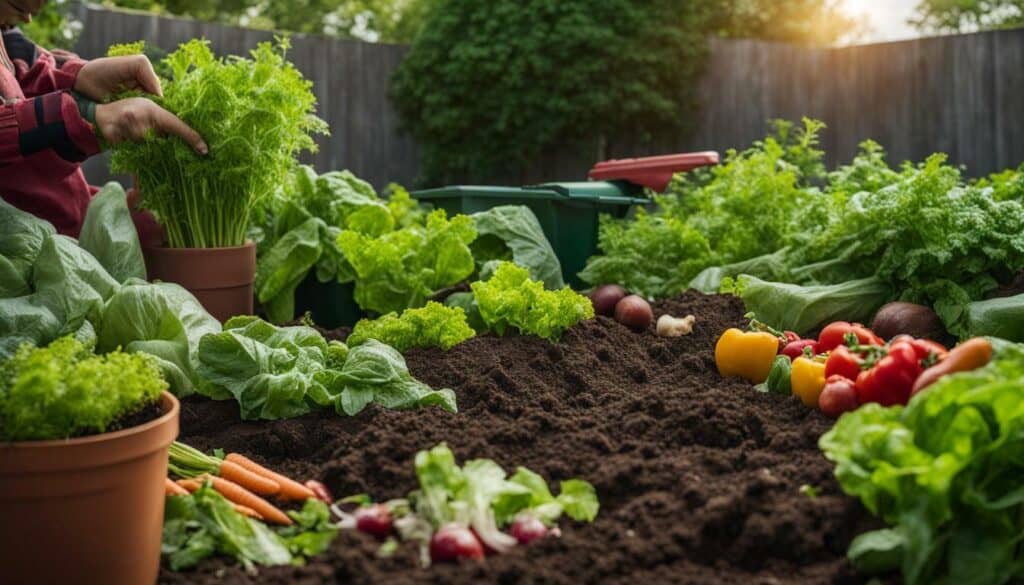
Remember, gardening is a fun and rewarding activity. Embrace experimentation and enjoy the process. Gardening hacks, like using a low-nitrogen, slow-release fertilizer, can help make the process easier and more successful. And don’t forget to seek help from gardening experts or local nurseries when needed. Happy gardening!
Planting and Watering Tips
Follow planting instructions and water your plants at the right times. It is essential to know your climate, soil type, average rainfall, and sunlight exposure to determine what plants can grow in your area. For beginners, lettuce and tomatoes are recommended as they are easy to grow.
Essential gardening tools such as a shovel, hand trowel, bypass for pruning, garden knife, and gloves are necessary for successful gardening. The right spot for planting is one that gets full sun, has quality soil, and good access to water. Consider soil testing to determine whether it needs amendments.
When planting, read the plant tags and space them accordingly. Fertilizing with a low-nitrogen, slow-release fertilizer is beneficial, but ensure proper application. Weeding is necessary to prevent the growth of unwanted plants, and it is important to harvest the plants at the right time.
Other tips include starting small, considering resources like nutrients, water, and sun, using the right tools, planting what you love and what grows well in your region, taking notes and paying attention to your garden, and not being afraid to ask for help. Persistence is key in gardening.
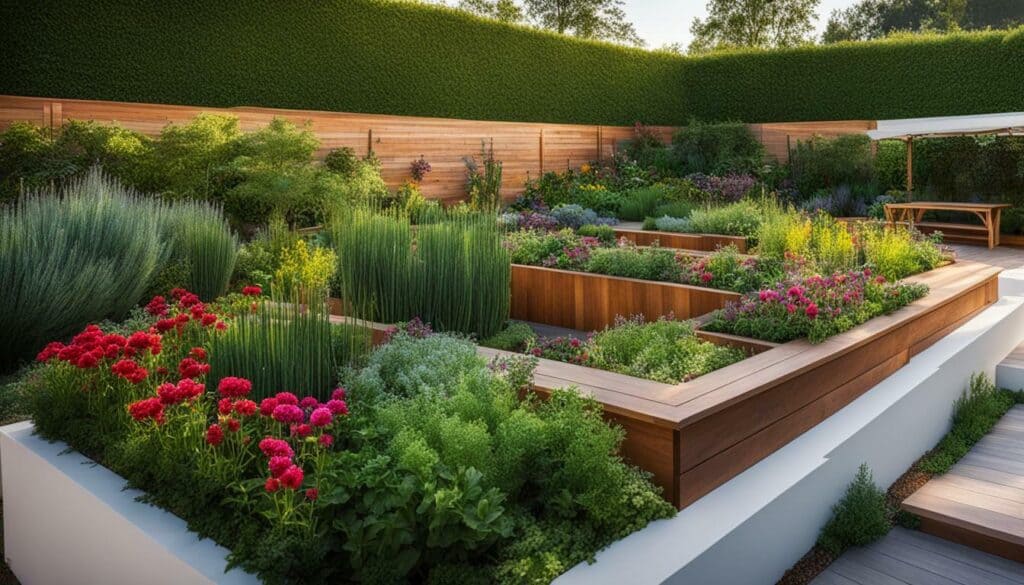
Frequent Weeding for a Healthy Garden
Weed regularly to keep your garden healthy. Weeding is an important task in maintaining a successful garden. It helps to remove unwanted plants that compete with your desired plants for resources such as sunlight, water, and nutrients. Weeding also prevents pests and diseases from spreading and allows your plants to grow and thrive.
To start a successful garden, planning and preparation are crucial. Consider your climate, soil type, average rainfall, and sunlight exposure to determine what plants will thrive in your garden. Choose plants that are suitable for your specific conditions and don’t require excessive maintenance.
Investing in quality gardening tools can also make the task of weeding easier and more enjoyable. A good shovel, hand trowel, and gloves are essential tools to help you maintain your garden with ease.
Choosing a location in your garden that gets adequate sunlight and has good access to water and quality soil is also important. If your soil is not ideal, you can improve it by adding compost or organic matter to enrich and nourish the soil.
Fertilizing your plants with a low-nitrogen, slow-release fertilizer provides necessary nutrients to encourage healthy growth. When planting, follow the instructions on the plant tags and make sure to water your plants at the right times and in the right amount.
Weeding is an ongoing task in the garden, as it helps to prevent weeds from choking out your plants. Take note of how your plants respond to different conditions and don’t be afraid to ask for help or experiment in your garden. With regular weeding and proper care, you can enjoy a healthy and thriving garden.
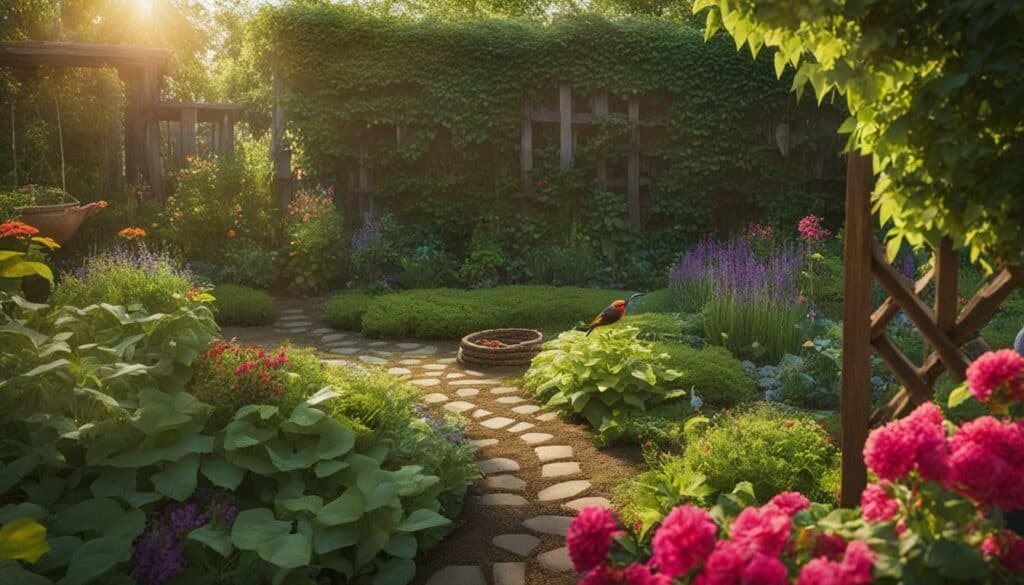
With these tips, you can maintain a healthy garden with ease, and even get creative with some outdoor DIY projects. Maintaining a thriving garden requires practice, patience, and regular weeding to keep the garden healthy and help your plants grow and thrive.
Using Mulch for Moisture Conservation
Consider using mulch to conserve moisture and prevent weed growth. Mulch is an excellent technique for retaining water in the soil and making it available for plants when needed.
Mulch also helps to reduce evaporation from the soil and can significantly reduce the amount of water needed to maintain a healthy garden. Additionally, it helps to suppress weed growth, making it easier to maintain a clean and healthy garden.
When using mulch, it is important to choose the right type. Mulch can be made from a variety of materials, such as wood chips, straw, or leaves. Choose a type of mulch that is appropriate for the plants in your garden. For example, coarse mulch can be used around shrubs and trees, while finer mulch is better suited for flowerbeds and vegetable gardens.
| Materials | Advantages |
|---|---|
| Wood chips | Slow to decompose, lasts longer than other materials |
| Straw | Inexpensive, easily available |
| Leaves | Free, natural, easily available in the fall |
Once you have chosen the right type of mulch, apply it correctly. Mulch should be applied in a layer around plants, leaving space around the stem to prevent moisture-related diseases. The layer should be between two and four inches deep. Be sure to avoid placing the mulch directly against the stem of the plant, as this can lead to rot and other issues.
Finally, it is important to replenish your mulch regularly. Mulch breaks down over time, and its effectiveness diminishes. The frequency with which you should replace your mulch depends on the type of material used and the climate you live in. As a general rule, you should replace your mulch once or twice a year.
Using mulch is an effective and environmentally friendly way to conserve moisture in the garden. It is easy to apply and can significantly reduce the amount of water needed to maintain a healthy garden. Consider using mulch in your garden to see the benefits for yourself.
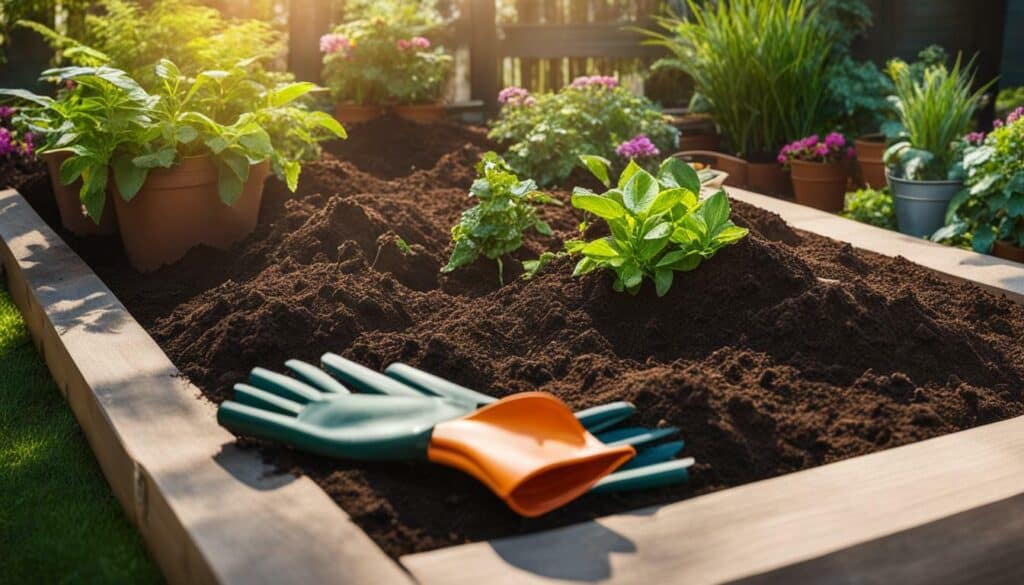
Embracing Experimentation and Seeking Help
And finally, don’t be afraid to experiment, take notes, and ask for help when needed. Backyard projects are a great way to challenge yourself and put your DIY gardening skills to the test. But remember, starting small is key, and considering your resources such as soil type, water conditions, and sun exposure are crucial to the success of your garden.
Acquiring the right tools is another important step. Investing in quality gardening tools can make all the difference in maintaining a healthy garden. Once you have the tools, plant what you love and what grows well in your region. If you’re not sure what to plant, consult with local nurseries or online resources for suggestions.
Keep in mind that gardening is a skill that comes with practice and experience. It’s important to take notes and learn from your trial and error. Don’t be discouraged by failures, but rather use them as opportunities to learn and improve.
If you find yourself struggling or have questions, don’t hesitate to ask for help. Gardening experts and local nurseries are great resources for advice and guidance. They can offer tips on plant care, pest control, and other helpful information.
Remember, gardening is a rewarding hobby that can provide beautiful outdoor spaces and fresh produce for your family. Keep trying, experimenting, and seeking help when needed, and you’ll soon be a successful DIY gardener!
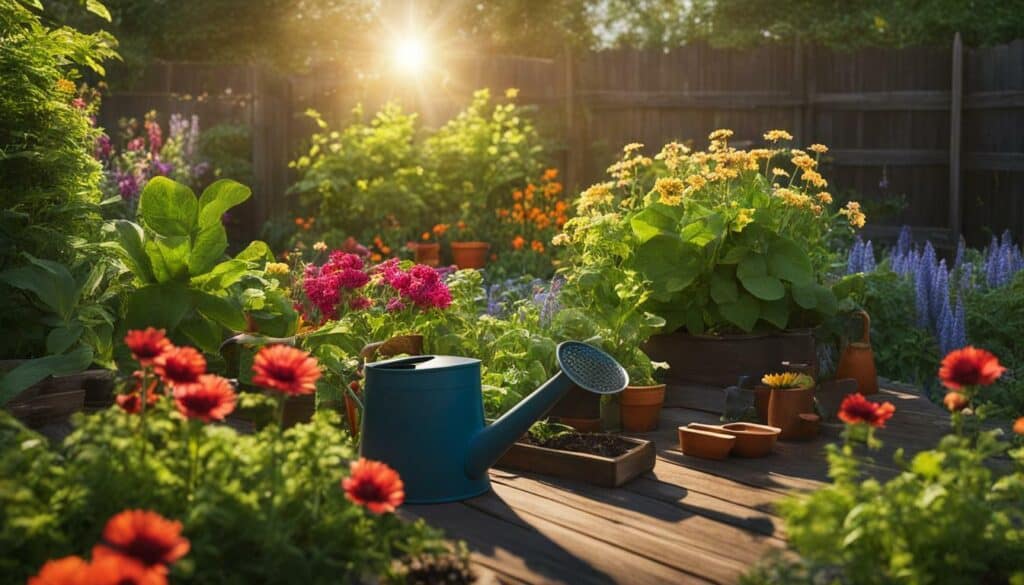
Are the Essential Tips for the Novice Gardener Suitable for Experienced Gardeners as Well?
Experienced gardeners often overlook the importance of revisiting the essential tips for novice gardeners. However, these fundamental guidelines can provide a fresh perspective even to the most seasoned green thumbs. Incorporating the essential tips for novice gardeners can serve as a reminder of the basics while possibly unveiling new insights or innovative techniques to enhance their gardening prowess.
Conclusion
With time and practice, you can become a successful gardener. Gardening is not only a fun and relaxing hobby but can also provide numerous health benefits. By following the do-it-yourself gardening tips outlined in this article, you can master the art of gardening and create a beautiful outdoor space.
Remember to start small and choose plants that are suitable for your region and climate. Use quality gardening tools and pick the right location for your garden. Enhance your soil with compost and provide nutrients with low-nitrogen, slow-release fertilizers. Properly plant and water your garden, and regularly weed to maintain a healthy environment. Utilize mulch to help conserve moisture and prevent weed growth. Lastly, don’t be afraid to experiment and seek help when needed.
Gardening is a process of trial and error, so don’t get discouraged if things do not go as planned. Keep trying, and in no time, your brown thumb will turn green, and you will be enjoying your thriving garden. So get started today and enjoy the joys of a do-it-yourself garden!
FAQ
Q: Is gardening difficult to master?
A: No, mastering gardening doesn’t have to be difficult. With the right tips and techniques, anyone can become a successful gardener.
Q: What plants should I choose for my garden?
A: Choose plants that are suitable for your climate, soil, and sunlight exposure. Opt for easy-to-grow plants like lettuce and tomatoes.
Q: What gardening tools do I need?
A: Invest in good gardening tools such as a shovel, trowel, bypass, and gloves. These tools will help you maintain a healthy garden.
Q: Where should I place my garden?
A: Pick a sunny spot with quality soil for your garden. If you have limited space, consider using containers or raised beds.
Q: How can I improve my soil?
A: Enhance your soil by adding compost or organic matter. This will provide essential nutrients for your plants and improve their growth.
Q: What type of fertilizer should I use?
A: Use a low-nitrogen, slow-release fertilizer to provide necessary nutrients for your plants. Follow the instructions for proper application.
Q: When should I plant and water my plants?
A: Follow the planting instructions specific to each plant and water them at the right times. Proper watering is crucial for their growth and survival.
Q: How can I keep my garden free of weeds?
A: Regular weeding is essential to keep your garden healthy. Use techniques to effectively remove weeds and prevent their growth.
Q: Should I use mulch in my garden?
A: Yes, using mulch is beneficial for your garden. It conserves moisture, prevents weed growth, and improves the overall appearance of your garden.
Q: Is it okay to experiment with gardening?
A: Absolutely! Don’t be afraid to experiment with different techniques and take notes. And if you need help, don’t hesitate to ask gardening experts or local nurseries.
Source Links
- https://evashockey.com/gardeninghacksgreenthumb/
- https://www.shape.com/lifestyle/mind-and-body/find-your-green-thumb-first-time-gardening-tips
- https://www.onegreenplanet.org/lifestyle/how-to-find-your-green-thumb-and-start-a-garden/
- https://www.trianglegardener.com/green-thumb-on-the-go-maintaining-a-portable-garden-for-frequent-movers/
- https://www.gardenersoasis.com/pick-the-right-plants/
- https://savvygardening.com/garden-center-tips/
- https://www.wikihow.life/Choose-Plants-for-a-Garden
- https://www.socialcircleace.com/art-diy-gardening-tips-tools-techniques
- https://www.thespruce.com/best-gardening-tools-4104448
- https://gardenfrontier.com/investing-in-high-quality-garden-tools/?amp=1
- https://www.gardensthatmatter.com/choose-garden-location/
- https://sebsnjaesnews.rutgers.edu/2020/04/choosing-the-right-location-for-your-vegetable-garden/
- https://www.almanac.com/where-put-vegetable-garden
- https://www.gardenista.com/posts/dirty-secrets-10-ways-to-improve-garden-soil/
- https://www.theprairiehomestead.com/2016/06/improve-garden-soil.html
- https://www.homesandgardens.com/gardens/how-to-improve-garden-soil
- https://extension.umn.edu/manage-soil-nutrients/quick-guide-fertilizing-plants
- https://www.almanac.com/how-fertilize-your-vegetable-garden
- https://topsoilpros.com/5-ways-to-add-nutrients-to-soil/
- https://www.thisoldhouse.com/gardening/21019230/garden-watering-tips
- https://www.bhg.com/gardening/vegetable/watering-vegetable-garden/
- https://www.hgtv.com/outdoors/gardens/planting-and-maintenance/the-proper-way-to-water-your-garden
- https://www.thegardencontinuum.com/blog/how-to-weed-your-garden-like-a-pro-part-1
- https://savvygardening.com/organic-weed-control-tips/
- https://www.themiddlesizedgarden.co.uk/guide-weeding-your-garden-easily/
- https://anoregoncottage.com/mulch-in-the-garden/
- https://www.akhomeshow.com/mulch-information-guide/
- https://aggie-hort.tamu.edu/plantanswers/drought/mulches.html
- https://pithandvigor.com/2022/07/backyard-biology-designing-a-garden-as-a-kids-science-lab/
- https://www.diseasebd.com/7-garden-therapy-diy-garden-projects-yummy-recipes-crafty-goodness/
- https://caremorebebetter.com/life-scaping-embrace-the-regenerative-wisdom-of-nature/
- https://blog.silvercuisine.com/diy-garden/
- https://www.theinspirationedit.com/11-diy-project-tips-for-a-better-garden/
- https://www.bhg.com/gardening/yard/garden-care/ten-steps-to-beginning-a-garden/
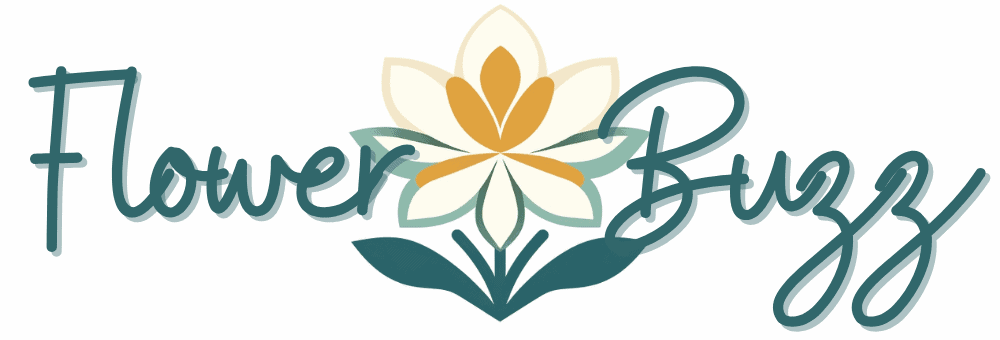
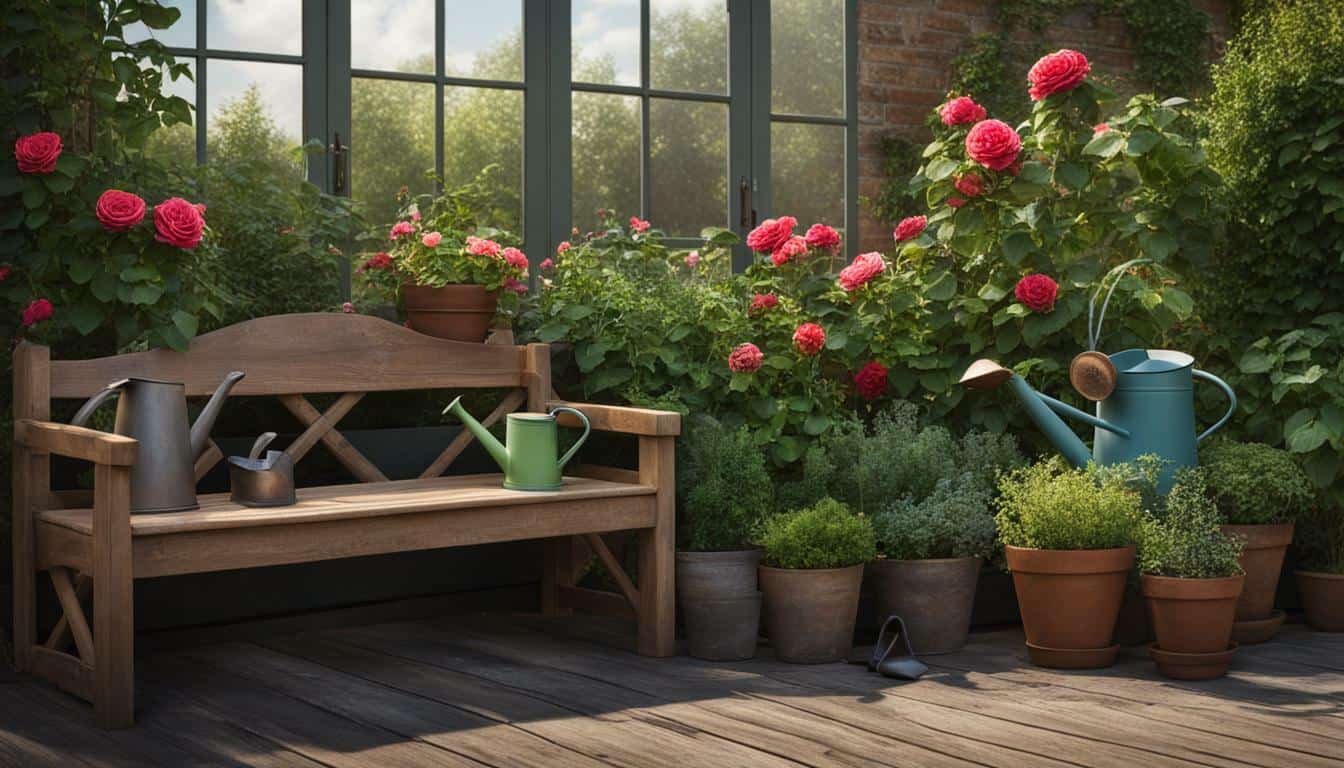
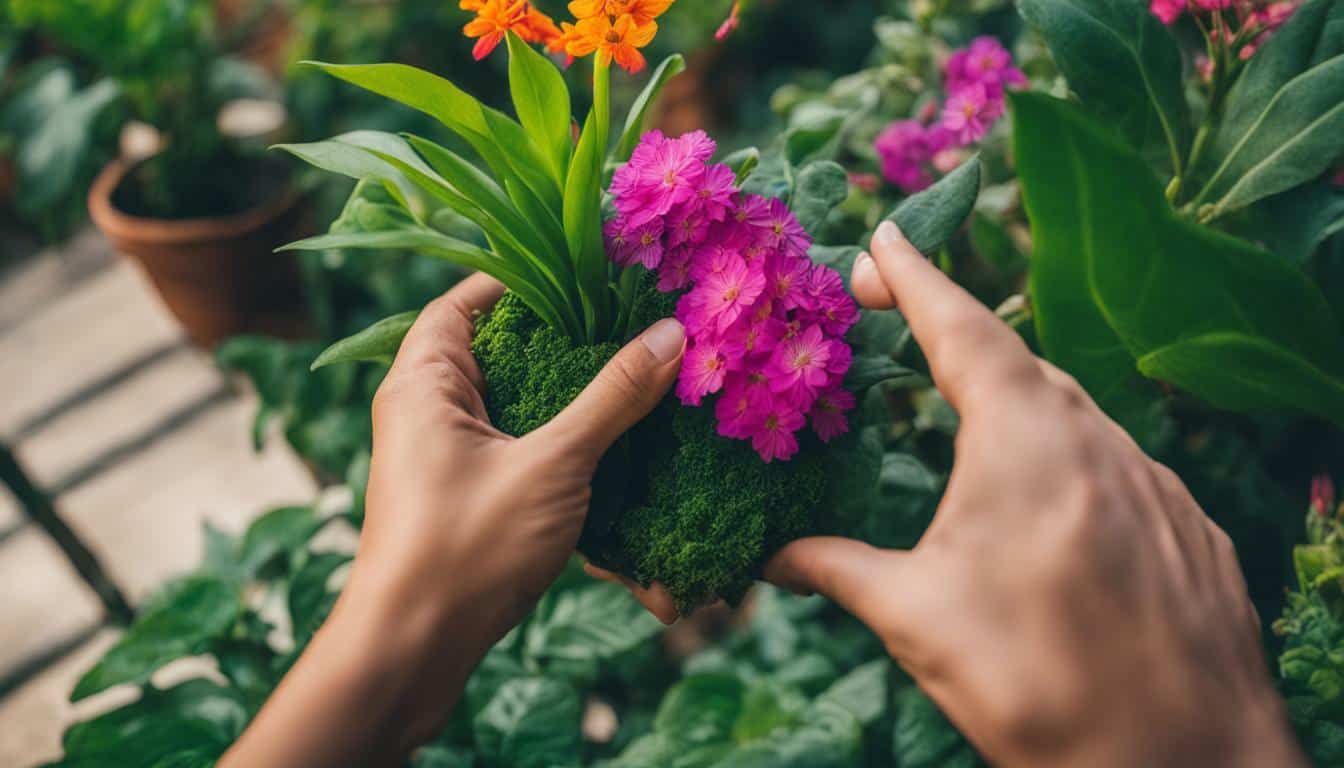
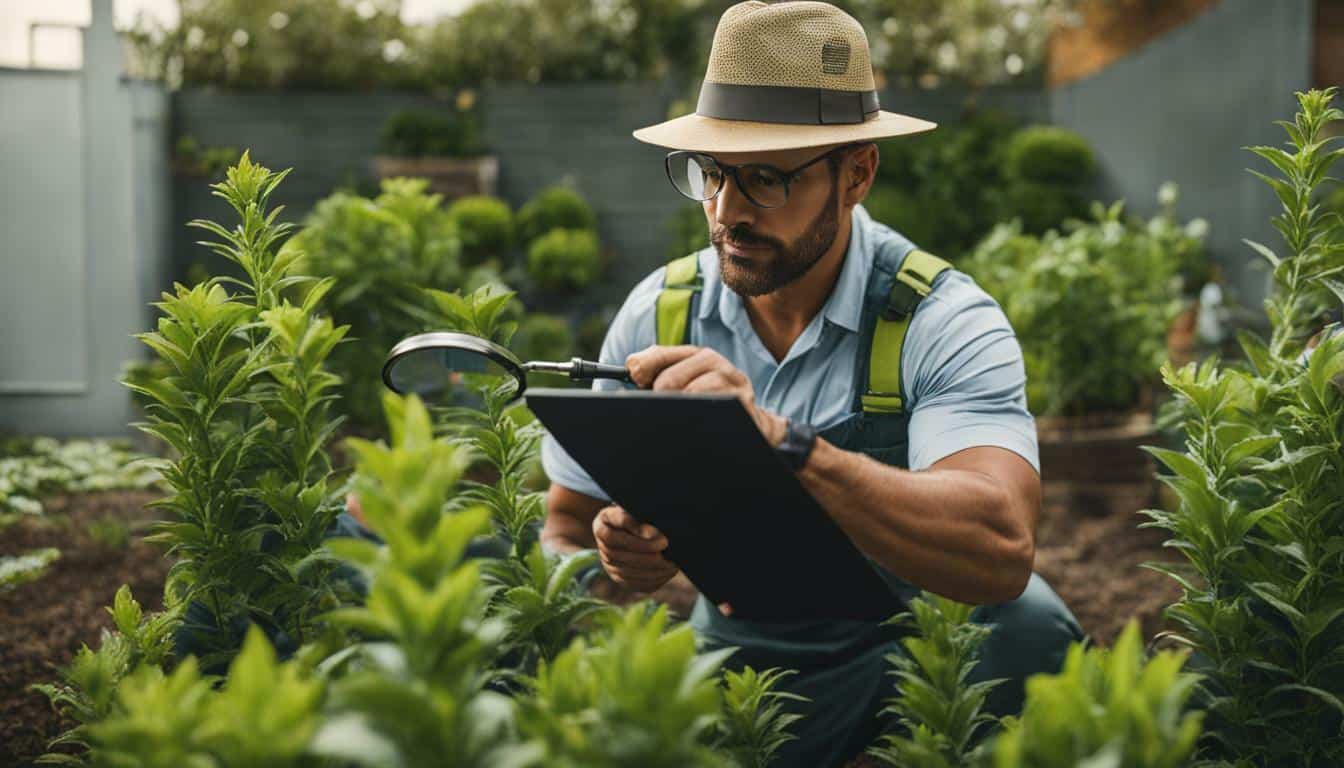

Leave a Reply